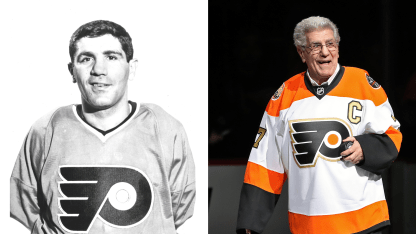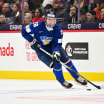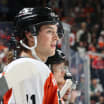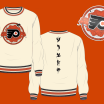Angotti exemplified the hard-working and competitive identity that coach Keith Allen encouraged from his team.As a Flyer, Angotti produced 12 goals, a team-high 37 assists, 49 points, 35 penalty minutes and a plus-four rating as the team won the Western Division. He dressed in all seven games of the Flyers' seven-game loss to the St. Louis Blues in the 1968 Stanley Cup Quarterfinals.
Born January 16, 1938 in Toronto, Angotti played junior hockey in his hometown and then played collegiate hockey for Michigan Tech before embarking on a pro career. Angotti played for the New York Rangers and Chicago Blackhawks before the Flyers selected him from Chicago in the 1967 Expansion Draft.
Flyers Hall of Fame defenseman Joe Watson, a teammate on the 1967-68 squad, remembers Angotti fondly.
"Lou was a smart player and a fine captain. It was a tough job for anyone, because we were an all-new team with 20 guys who had come from six different organizations. We had a good coach in Keith Allen, but every coach needs players who buy in to what he preaches.We didn't have a lot of scoring, but he had good goaltending and Keith coached us to play a disciplined and defensively smart style. Lou really helped set that tone," Watson recalls.
"He was also a really good captain off the ice. Lou and his wife lived in Delaware County -- I think in Springfield -- and they hosted a lot of team parties. Everyone was included. I think that's important. We became a very close-knit team that first season, and things like that were part of what brought us together as a team."
After losing each of the first two games of their inaugural season, the Flyers collected the first win in franchise history on Oct. 18, 1967: a 2-1 road win over the St. Louis Blues. Angotti's goal in the final 35 seconds of the second period knotted the score at 1-1 and set the tone for a strong third period that saw the late Ed Hoekstra put the Flyers ahead to stay.
In late December to early January of that season, with several players ailing, Angotti stepped up the offensive side of his game and rattled off 15 points (3g,12 a) in a seven-game span.Most notably, Angotti had a three-assist game and a fight with Real Lemieux in a 9-1 rout of the LA Kings at the Spectrum on Dec. 31. On Jan. 18, the team captain posted a goal and two assists in a 4-2 win at home against the Minnesota North Stars.
Apart from winning the Western Division, which consisted entirely of the six new first-year teams, the overachieving Flyers were the only expansion team to beat each of the "Original Six" teams at least once during the 1967-68 season. During the playoffs, Angotti was held off the score sheet but was heavily relied upon by Allen. The Flyers lost a seven-game war of a series to St. Louis.
"All of us liked Lou as a person and we all respected him as a player and leader," Watson recalls. "He could make us laugh, too, without meaning to. He never carried a wallet, so he carried all his money rolled up in his sock. He'd count it about 10 times a day, too, to make sure it was all there. He'd count it before he went to the rink, at the rink before he put on his uniform, and when he put his street clothes back on afterwards. I never saw that before."
Following the 1967-68 season, Flyers general manager Bud Poile traded Angotti to the Blues. On June 11, 1968, the Flyers dealt Angotti and Ian Campbell to St. Louis in exchange for Darryl Edestrand and Gerry Melnyk. Angotti subsequently spent second tours of duty with Chicago and the Rangers as well as stints in Pittsburgh and St. Louis in an NHL career that lasted through 1973-74 (spending the latter part of the season as a player-coach with the Blues). After his coaching stint with the Blues ended early in the 1974-75 season, Angotti briefly played in the fledgling World Hockey Association with the Chicago Cougars. In 1983-84, he returned to the NHL for one season as head coach of the Pittsburgh Penguins.
"He never had teams to coach that had any talent on the roster or desire to win, which was a real shame," Watson said. "Louie would have been a good NHL coach if there were a few more guys on those teams who could play."



















